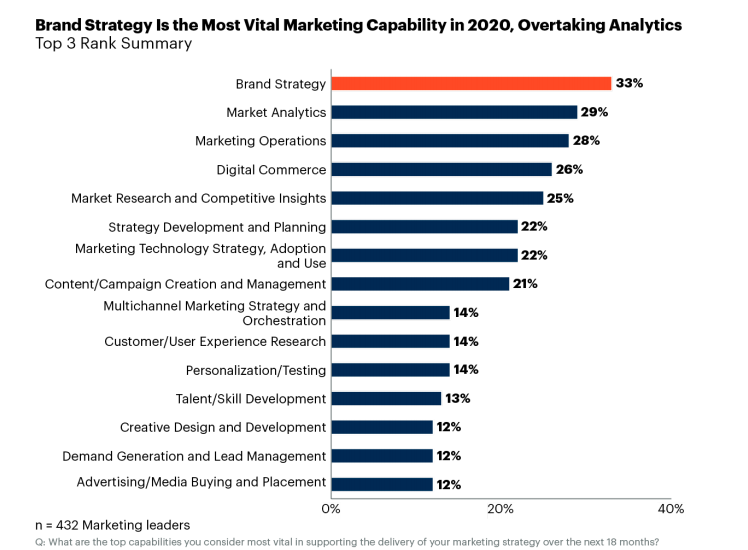- July 5, 2020
- Posted by: Chase Gregory
- Categories: Email Marketing, Manufacturing, Marketing, Public Relations, SEO, Social Media, Video, Web Design

Marketers remain the gimlet-eyed optimists of the management team, believing the worst of the economic impact of COVID-19 will pass quickly.
The bosses, however, do not agree, according to Gartner’s annual CMO Survey which was released overnight.
“Gartner data from a poll of CFOs showed that the majority (almost 60 per cent) are building scenario plans that include a second wave of the disease outbreak. Further Gartner poll data indicates that they see a strong connection between the disease outbreak and challenges with the macroenvironment, revenue losses, and demand. ”
The authors note that this concern is shared by CEOs, and they quote data from a recent World Economic Forum survey to support that. WEF found that 60 per cent of CEOs believe that there will be a U-shaped recession, while 22 per cent believe it could be a double-dip, W-shaped recession.

Despite this, according to Ewan McIntyre, vice president analyst for Gartner for Marketers, CMOs remain stoic in the face of adversity and as such, they are significantly out of step with other members of the C-suite.
“We are seeing a significant number of CEOs and CFOs building scenario plans that include a second wave of the COVID-19 pandemic. As we progress into the ‘recover’ and ‘renew’ phases of this pandemic, CFOs will turn their attention to profitability, and marketing has the dubious honor of topping the list of functions where finance will look to trim expenses even further.”
While companies have cut back on marketing budgets due to COVID-19, almost three quarters (73 per cent) of CMOs expect the pandemic’s negative impact to be short-lived, with a positive outlook for business performance in the 18-24 months, according to Gartner’s CMO Spend Survey 2020.
In fact, CMOs report they expect to increase investments across major channels and resource areas in 2021. Gartner warns that this outlook may be overly optimistic.
While pre-COVID-19 marketing budgets remained flat year-over-year, making up 11 per cent of overall company revenue, more than 44 per cent of CMOs have experienced mid-year budget cuts as a result of the pandemic and 10.7 per cent of those expect their budgets to face significant cuts of more than 15 per cent.
McIntyre advises CMOs to plan for future budgetary pressures now, rather than gamble on budgets bouncing back.
“The brands that succeed in uncertain times are those that recognize the change around them and adjust to it, rather than wait for things to go back to normal. CMOs need to build a plan that sets out the costs that can be eliminated, the essential costs that must be shielded and the costs where greater efficiency and ROI can be delivered.”
The CMO Spend Survey 2020, conducted with more than 430 marketing executives in North America, the U.K., France and Germany from April 2020 through May 2020, tracks the critical areas marketers are investing in and where cuts are being made from people, programs and technologies.
Brand Building
Another key finding is that the shift back to brand which has been threatening to re-emerge for some time away is now clearly underway.

According to Gartner, as a direct result of the COVID-19 pandemic and other market uncertainty this year, CMOs (33 per cent) now rank brand strategy as one of the top three strategic priorities.
This is a significant leap from the lowly position near the bottom of the list in 2019 and the first time brand has surpassed other capabilities like analytics, personalization, and marketing technology (martech).
“Brand awareness and relevance in times of strife is more important than ever,” said Mr. McIntyre.
“We are seeing successful brands take action that is authentically connected to their brand strategy and value proposition.”
A ride on the Fail Whale, twice
The survey also reveals two areas of the previous marketing priority where marketers are struggling.
Firstly, despite the primacy of the data-driven marketing story in recent years, many organisations can’t even build rudimentary analytics capabilities, say the researchers. As a result, while analytics is still a top-three priority it has dropped nearly 10 percentage points year-over-year, with a little of over a quarter of CMOs ranking it so.
Secondly, it transpires that personalization which martech vendors have pushed aggressively for years works well in Powerpoint but not so well in the world of real things.
The responses of marketing leaders now clearly demonstrate that personalisation is in retreat, dropping to only 14 per cent. “This drop emphasizes the Gartner prediction that 85 per cent of marketers will abandon their personalization efforts by 2025 due to a lack of ROI, the perils of customer data management, or both, according to the report.”
Dude, where’s my ROI?
CMOs are not maximising the return on their marketing technology investment, with only 58 per cent saying they are utilising their martech stack’s full capabilities. That led Gartner to caution that unless a more clear ROI emerges, martech spending will face the razer.
Yet, despite lagging utilisation, and the disappointments of analytics and personalisation, marketers are doubling down on their martech investments at least for now. Martech will constitute 26 per cent of marketing budgets in 2020 and a clear majority of CMO’s expect to increase their spending in this area over the next 12 months.
“CMOs believe technology will help them navigate through difficult times and recover faster, and thus will continue to shield these investments – like customer data platforms, mobile marketing platforms, and digital commerce – from further cost efficiencies,” said. McIntyre.
Digital acceleration
Conversely, the gathering skepticism over martech is occurring at the very time that digital advertising is surging in importance due to the COVID-19 disruption which Gartner says is accelerating many organisations’ moves online.
In 2020, investments in paid, owned and earned digital channels now account for almost 80 per cent of multichannel budgets, with digital advertising and search advertising taking nearly a quarter (22 per cent), social marketing (11.3 per cent) and website (10.4 per cent) topping the list, according to the report.
Gartner says budgets have still been hit in 2020, with 28 per cent of CMOs stating they have cancelled media buys, marketers remain confident on the outlook for paid media in the next 12 months.
Seventy-four percent of CMOs report they will increase spending on digital advertising and 66 per cent expect to increase spending on paid search. “CMOs should tread lightly with their expectations for paid media in the months ahead, as solid investments are likely to weaken as economic challenges following the global pandemic persist,” said Mr. McIntyre.
